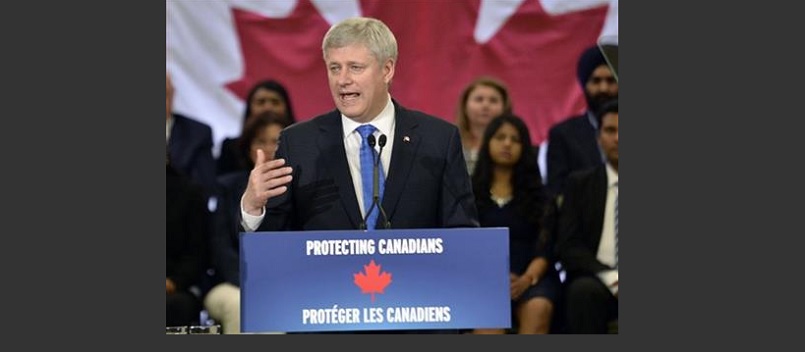
Canadian Prime Minister Stephen Harper triggered an election campaign Sunday and set the vote for Oct. 19, when Harper and his Conservative party hope to earn a fourth term after almost a decade in power.
Analysts say the election is a toss-up and Harper faces an uphill battle to form another majority government. If Harper wins he would become the first prime minister since 1908 to win four consecutive elections.
The prime minister dissolved Parliament Sunday in a visit to the governor-general, who serves as Canada's formal but mostly ceremonial head of state.
Harper has managed to nudge a traditionally center-left country to the right since coming to power in 2006.
He has gradually lowered sales and corporate taxes, avoided climate change legislation, supported the oil industry against the environmental lobby, increased military spending and backed Israel's right-wing government. He has deliberately avoided sweeping policy changes that could derail his government.
Harper, 56, said the election is about keeping the economy strong and Canadians safe from terrorist attacks. He said now is not the time for inexperience and "political correctness," referring to the opposition leftist New Democrat party.
"A national election is not a popularity contest," Harper said. "It's a genuine choice between practical, serious, real-world experience and a dangerous approach that has failed before and is failing in other countries."
Analysts say a minority government in Parliament is likely no matter what party wins the most seats in Parliament. That would mean the winning party would have a shaky hold on power and need to rely on another party to pass new legislation.
A coalition government between the leftist New Democrats and Liberals is also possible.
Analysts say the opposition New Democrats, led by Tom Mulcair, 60, have a chance to gain power after the party won control of the legislature in Alberta, Canada's most conservative province, a few months ago.
"Canadians are telling us that they want change. After 10 years of Stephen Harper in Ottawa they want to turn the page," Mulcair said.
Liberal leader Justin Trudeau, son of late Prime Minister Pierre Trudeau, is also in the running to be the next prime minister. But he has trailed in recent polls after Conservatives have run repeated attack ads saying the 43-year-old is not ready for the job.
The first televised debate is this Thursday and is seen as a key test for Trudeau, the son of the man whose legacy Harper is trying to erase.
Former colleagues of Harper say his long-term goals are to kill the once widely entrenched notion that the Liberals — the party of long-time leaders Pierre Trudeau and Jean Chretien — are the natural party of government in Canada, and to redefine what it means to be Canadian.
Harper called the election in the middle of a long holiday weekend in Canada in the dead of summer, triggering an unusual 11-week campaign rather than the usual five-week campaign that usually takes place. The campaign will be the longest in Canada since 1872, but each party has already been unofficially campaigning for months.
